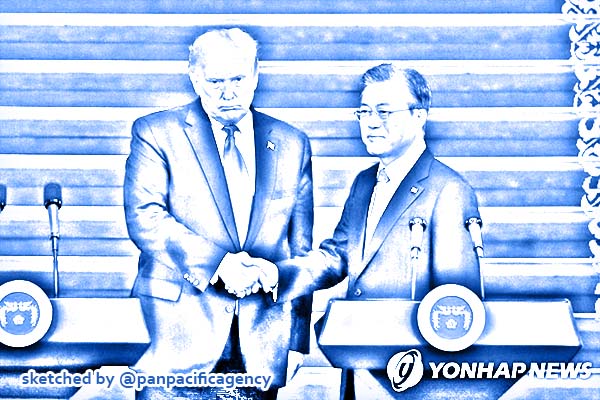Moon-Trump summit shows money may matter more in alliance

South Korean President Moon Jae-in (R) and U.S. President Donald Trump shake hands after a joint press conference at the presidential office, Cheong Wa Dae, in Seoul on June 30, 2019. (Yonhap). Sketched by the Pan Pacific Agency.
NEW YORK, Sep 24, 2019, Yonhap. In his ninth summit with U.S. President Donald Trump Monday, South Korean President Moon Jae-in seems to have achieved two goals — reaffirming his resolve to help advance the Korea peace process and securing a firm commitment to a robust Seoul-Washington alliance, reported the Yonhap.
Apparently, however, Moon again realized the reality that the alliance, which Cheong Wa Dae describes as “not swerving with no doubt,” is not free.
Trump began his first face-to-face talks with Moon in three months with a televised statement on “tremendous trade deals,” on which the two sides are working.
He expressed satisfaction with the recent revision of a bilateral free trade agreement. “And we intend to do some additional things on trade,” he said.
Abruptly he said, “We’ll be talking (about) the purchase of equipment. South Korea is one of our largest purchasers of military equipment. And we’re working together very well.”
Trump was speaking in front of media, with Moon seated next him, just before the opening of their summit at a New York hotel.
In response, Moon spoke highly of Trump’s “imagination and bold decision-making” for a visit to the June 30 truce village of Panmunjom inside the Demilitarized Zone (DMZ), where he met with North Korean leader Kim Jong-un and briefly stepped over the military demarcation line onto the communist nation’s soil.
Moon held out expectations that Washington and Pyongyang will resume working-level negotiations soon to lay the groundwork for another Trump-Kim meeting.
Trump then praised himself in his typical style. “If I weren’t President, you’d be at war with North Korea, in my opinion,” he stressed. “If the same group was in that preceded me, you’d be in a war with North Korea.”
During the ensuing closed-door session, Moon and Trump pooled ideas on ways for the success of the upcoming working-level nuclear talks, according to Cheong Wa Dae officials.
There was no consultation on a “new method,” which Trump had signaled probably to replace the “Libyan model” for the denuclearization of North Korea, they said.
Through the summit, they added, Moon has confirmed that Trump has a “strong determination” for “substantive progress” in the denuclearization and peace-building issue on the basis of his Singapore accord with the North’s leader.
Moon’s aides initially wanted the summit to focus on the North Korea issue, citing the urgency of revitalizing the peace process, as they are seeking to persuade the North’s leader to take part as an observer in the two-day South Korea-ASEAN summit to open in Busan on Nov. 25.
They also hoped to use it as a chance to ease public concerns about the health of the alliance.
However, the sensitive issue of sharing defense costs was raised. Both Moon and Trump explained their “basic” positions.
Trump, a former businessman, has openly pressed U.S. allies to sharply increase their financial contribution to assistance in national security.
Moon emphasized the need for South Korea to share the cost of the U.S. Forces Korea on a “reasonable and fair” level.
In a bid to convince Trump that Seoul is already playing its part, Moon even presented data on its purchase of U.S. weapons systems over the past decade and its plans to buy more in the next three years.
Over the past 10 years, South Korea has introduced US$6.7 billion worth of weapons from the U.S., equal to 16 percent of Seoul’s total defense budget for this year, official data showed. Between 2008 and 2017, it ranked third in terms of the volume of American arms exports after Saudi Arabia and Australia, South Korea’s Defense Agency for Technology and Quality said.
Moon also pointed out that South Korean businesses are investing more in the United States.
Earlier in the day, South Korea signed a long-term contract to buy US$9.6 billion worth of liquefied natural gas (LNG) from the ally.
Hyundai Motor, South Korea’s largest carmaker, agreed to form a joint venture with Aptiv, based in Ireland, for the development of self-driving system. The joint company will be based in Boston.
It was unusual for Cheong Wa Dae to place such weight on arms procurement and “win-win” economic partnerships in press briefings after a summit between Moon and Trump.
Cheong Wa Dae spokesperson Ko Min-jung used a rather refined expression.
Moon and Trump have reached an agreement to keep the alliance moving in a “reciprocal and comprehensive” direction that includes close economic cooperation, she said.
An expert said it remains unclear how speedily the peace process will move, which would depend largely on Pyongyang’s attitude.
“North Korea’s lack of denuclearization and condescending behavior toward South Korea suggest it is interested in exchanges only when it can receive benefits for little or nothing,” Leif-Eric Easley, associate professor of international studies at Ewha Womans University in Seoul, said.
With U.S. diplomats and a number of pundits aware that denuclearization cannot be accomplished in one shot, it’s reasonable to signal a step-by-step approach to restart working-level talks, he suggested.
He said Washington should not adopt a “new method” if that meant switching from maximum pressure to maximum flexibility.
“Trust building is not the product of unconditional engagement but commitment to diplomacy with accountability,” Easley said in emailed comments.
It’s not the job of Seoul or Washington to guarantee the security of the Kim regime, he said.
By Lee Chi-dong